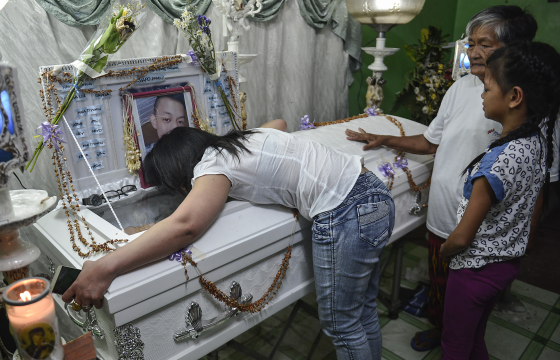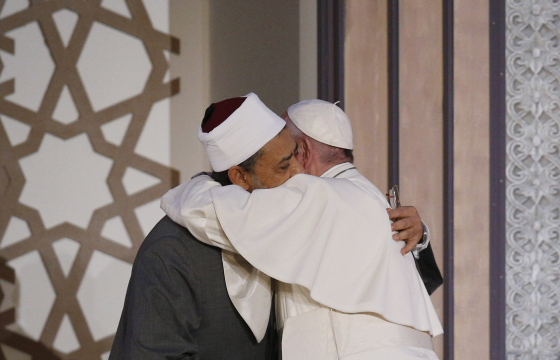Pope Francis kicked off his trip to Egypt by issuing one of his strongest condemnations of religious violence and urging Muslim scholars to join with the world’s faith leaders to condemn acts of terror carried out in the name of God. Francis made his forceful appeal during a long and at times lyrical speech at a peace conference organised by Cairo’s Al-Azhar university, the leading centre of Sunni Islamic thought.
His 27-hour visit to Cairo comes at a time when Egypt’s Christian population is increasingly under attack with two Coptic churches attacked in the cities of Tanta and Alexandria on Palm Sunday. “Let us say once more a firm and clear ‘No!’ to every form of violence, vengeance, and hatred carried out in the name of God,” the Pope said during his speech at the 10th century mosque and university’s conference centre.
Francis flew from Rome to Egypt this morning telling journalists on board the papal plane that he was on a mission of “unity and brotherhood” in a country that is seeing a rise in Islamist terrorist attacks against the country’s ancient Christian community.
After his plane touched down in Cairo International airport, the Latin American pontiff was greeted by government and church officials including Cardinal Jean-Louis Tauran, the President of the Pontifical Council for Inter-Religious Dialogue, a leading figure in Catholic-Muslim relations.
POPE IN EGYPT 2017
-
'WICKED' TABLET CORRESPONDENT SHARES A JOKE WITH POPE FRANCIS
-
WAR WITH NORTH KOREA COULD DESTROY 'MUCH OF HUMANITY', FRANCIS WARNS
-
'FORGIVE THOSE WHO HAVE WRONGED US', POPE TELLS STADIUM CONGREGATION
-
FRANCIS CHALLENGES MUSLIM LEADERS TO CONDEMN RELIGIOUS VIOLENCE
-
THE TANGLED ROOTS OF VIOLENCE IN THE HISTORY OF RELIGION
-
THE STRUGGLE FOR RELIGIOUS INDEPENDENCE AT CAIRO'S AL-AZHAR
-
BEING A COPTIC CHRISTIAN IN 'ISLAMICISED' COUNTRY LIKE EGYPT
-
CHRISTIANS 'ALWAYS HAVE HOPE', POPE SAYS AHEAD OF TRIP TO CAIRO
-
POPE MAY STRUGGLE TO WALK IN NAMESAKE'S FOOTSTEPS IN MODERN-DAY EGYPT
Following a low-key welcome he was whisked away in a Fiat car with a Vatican flag and number plate for a private meeting with President Abdel Fattah El-Sisi at the presidential palace, a building previously used as a military hospital by the British during both world wars.
The key event, however, was his address at Al-Azhar where the Pope gave one of his strongest and most detailed condemnations of religious terrorism, using language that would have been readily understood by his largely Muslim audience.
“We have an obligation to denounce violations of human dignity and human rights, to expose attempts to justify every form of hatred in the name of religion, and to condemn these attempts as idolatrous caricatures of God,” Francis stressed. “Peace alone, therefore, is holy and no act of violence can be perpetrated in the name of God, for it would profane his name.”
Al-Azhar has a long tradition of offering authoritative interpretations of the Koran, although it is passages from the Islamic holy book that are being used by Islamic State’s Sunni ideologues to justify terrorism. Before Francis spoke the Grand Imam of Al-Azhar, Ahmed el-Tayeb, called for religions to be liberated from “false concepts, misunderstandings, malpractices, and false religiosity attached to them” stressing that an entire faith should not be held “accountable for the crimes of any small group of followers”.
“Islam is not a religion of terrorism because a group of followers carelessly expedites to manipulate Islamic texts and misinterpret them ignorantly,” he said. “We deeply appreciate your fair declaration in support of the truth and defence of Islam against the accusation of violence and terrorism.”
El-Tayeb also pointed out that Judaism was not accused of terrorism, despite Israel’s actions in Palestine. “Judaism is not a religion of terrorism just because a group of its followers employs the teachings of Moses…occupying lands and extirpating millions of the indigenous defenceless civilian citizens of the Palestinian people,” he said.
In his speech the Pope stressed that religion must be seen as “part of the solution” to conflict, warning against moves to privatise faith, or act as if it doesn’t matter.
“Human beings cannot attempt to encounter one another in peace by eliminating God from the horizon,” Francis said. The problem occurs, the Pope explained, when a fundamentalist form of faith develops that is used to justify violence while “demagogic forms of populism” and the arms trade were fuelling instability and conflict.
“As religious leaders, we are called, therefore, to unmask the violence that masquerades as purported sanctity and is based more on the ‘absolutising’ of selfishness than on authentic openness to the Absolute,” Francis told his audience who regularly peppered his words with applause.
Stressing the need for education, he said “young people, like well-planted trees” can help “turn the polluted air of hatred into the oxygen of fraternity” while pointing out that Egypt had a long history of peaceful co-existence between religions. He went on: “What is needed today are peacemakers, not fomenters of conflict; firefighters not arsonists; preachers of reconciliation and not instigators of destruction.”
The world, he added, needs a “civilisation of peace and encounter” as first witnessed to by St Francis of Assisi - the Pope’s namesake - when he travelled to Egypt during the fifth crusades to meet with Islamic military leader Sultan Al-Kamil.




 Loading ...
Loading ...